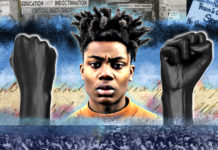I can’t wait for the opening night of Marvel’s Black Panther, which, if black folks have anything to do with it, will be the event movie of the year.
For half a century I’ve waited to see a black superhero that wasn’t a sidekick or a diversity consolation prize. My time is almost here, but until February 16th, the day I have pre-purchased tickets for my family, I’ll have to settle for lesser heroes.
And, that’s where Black Lightning comes in.
This addition to CW’s portfolio of comic revivals came to my attention by accident on YouTube TV. By my low standards for TV, it’s a true winner.
But there’s one thing I didn’t catch until just now. In this YouTube review of the show (below) we discover that not only is Jefferson Pierce (Black Lightning) a school principal by day (I knew that), but he’s a principal at a charter school.
Wow. Didn’t see that coming.
Pierce is my second television sign of the mainstreaming of charters. The first was in The Foster’s, a show about a San Francisco lesbian couple that adopts foster children and puts them in Anchor Beach Charter School where one of the moms works. I love the show, but whenever it makes statements about the school being a charter it’s silly. There should be a laugh track. (like the episode where Jude was almost expelled for not passing a standardized test).
Back to Black Lightning.
It’s dope. The world needs more thoughtful and broad representation of black people the way Lightning portrays us.
Most people of good will would agree, but the addition of a charter school in the story causes trouble. It hit a nerve with Steven Singer, a hype man for the Badass Teachers Association (a group of bad teachers who’ve found common cause in defending bad teachers).
He’s pissed. He wants to know why the CW felt the need to make Garfield High a charter school?
Why, CW!? Why put your hero at the head of a charter school?
In the original DC comic book on which this television series is based, Pierce is a principal at Garfield High School in the fictional city of Metropolis.
When the writers moved the setting to New Orleans and made the hero a charter school principal, they were making purposeful changes to the mythology.
Why?
What does it add to the series with the inclusion of this extra detail?
Yes, Jefferson Pierce is African American. It’s about time we have more black superheroes. Marvel did an amazing job with its Netflix show based on Luke Cage, a character also created by writer Tony Isabella.
Listen, Pierce is black, which is good, but he’s one of those blacks, the kind who fail to drink from the white progressive well.
That’s a bad black. Dare we say uppity?
Now, that Luke Cage, he’s better. He doesn’t offend teachers’ unions. He just dodges bullets, fights black politicians, and bumps fuzzies with Rosario Dawson.
Good boy. Heel.
Here comes Singer’s real trump card:
But charter schools are not uniquely black. The National Association for the Advancement of Colored People (NAACP) issued a moratorium on charter school expansion just last year. The national civil rights organization has been publicly critical of charter schools’ impact on children of color since 2010.
Sorry Steve, that dog don’t hunt.
I feel like Effie on that episode of Project Greenlight when Matt Damon sought the Heisman of whitesplaination awards by explaining to her why diversity on the show was unimportant.
In a state of aw-hell-no-ish-ness all she could say was “Wow. Okay.”
Singer plays the role of Damon here. He explains to us what black is and what it is not.
The 700,000 black children in charter schools, not black.
The fact that charters have more black principals than government schools, not black.
Black parents who prefer charter schools over government schools, nope, they’re not black.
The countless black families sitting on waiting lists like Willy Wonka waiting to get their golden ticket, not black either.
Who does Singer consider really black? The NAACP.
Someone should remind him that the NAACP has never been a black organization. Since it’s founding it has been decidedly multi-racial.
Now, if Singer wants to know what black civil rights groups think he should look to the UNCF and the Urban League. They’ve been black since jump. Both of those organizations have not joined the anti-school-choice moratorium that was written by white teachers’ unions for their various afroplastic grantees.
What’s So ‘Black’ About Charter Schools?
Does anyone ever really ask the parent who chooses charter schools why they do it? Does anyone care or is it all a political battle between interests groups who all want to claim ownership of the voiceless, but they want to do it without listening to the voiceless?
A study in the Journal of Negro Education from 2012 called “The Black Charter School Effect” researched reasons for a higher rate of black families choosing charters and found there is something situationally unique about black parents’ motivation.
Results indicate that the main reason parents withdrew their children from the local traditional public school was to improve the quality of education their students were receiving. Parents defined “quality of education” as smaller class sizes, better teachers, teacher familiarity, a sense of belonging, one-on-one attention, and supportive staff. Parents were more influenced by a better-disciplined schooling environment than by better academic achievement.
[…]
Charter schools that serve large proportions of Black students have very distinct characteristics. These schools tend to vary tremendously from the cultures and practices of traditional public schools, and in many cases, have achieved success. There were five commonalities among the literature that constitute the characteristics of these schools: (a) a defined mission statement that emphasizes academic performance, (b) a culture of high expectations, (c) a college-going atmosphere, (d) a focus on standardized tests and the use of regular internal evaluations, and (e) longer school days and extended academic years.
Getting an education for our kids shouldn’t require Black Panther-like acrobatics where we lie about our address or apply for multiple scholarships, or dance for the magnet school enrollment committees, or beg principals to sequester our kids into special programs away from the general population.
But it does require that level of effort.
There is something uniquely white about ignoring the reasons black families look for advantages, options, alternatives, and pathways out of their redlining into government schools.
I hope Singer will do less whining about fictional superheroes, and more explaining of his real-world white obstructionism to black education.
Additional reading:
- How ‘Blade’ and ‘Spawn’ Paved The Way for Black Panther
- How Black Panther Blends Politics, Culture, and Technology Unlike Any Other Superhero Film
- Angry Alt-Right Trolls Target Black Panther, But It Isn’t Working
- Ten Black Superheros You Should Know More About
- Black Superheros Matter: Why A ‘Black Panther’ Movie Is Revolutionary










